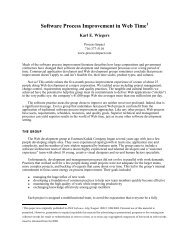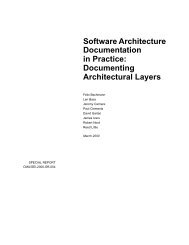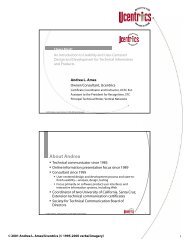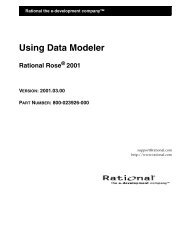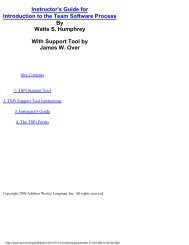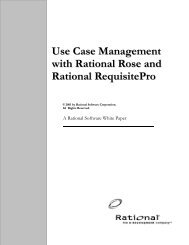RSI - A Structured Approach Use Cases and HCI Design
RSI - A Structured Approach Use Cases and HCI Design
RSI - A Structured Approach Use Cases and HCI Design
Create successful ePaper yourself
Turn your PDF publications into a flip-book with our unique Google optimized e-Paper software.
The <strong>RSI</strong> <strong>Approach</strong> To <strong>HCI</strong> <strong>Design</strong> / <strong>Use</strong> Case Analysis Page 33 of 42<br />
• aReservation.start-date = start-date<br />
• aReservation.end-date = end-date<br />
• aReservation.reservedby = aCustomer<br />
• aReservation.reserved = aRoom<br />
W5a - <strong>RSI</strong> LONG PAPER [42 PAGES].doc( Rev: 5) - 03/09/00<br />
update service use case 'make reservation'<br />
The descriptions above use a number of semi-formal conventions (based loosely on OCL),<br />
which experience shows assist in removing ambiguity:<br />
• Names that correspond to types in the specification model are capitalised;<br />
• <strong>Use</strong> of an instance of a type in the specification model is indicated by pre-fixing by 'a'<br />
or 'an' onto the type name. Additional qualification (aFirstCustomer, etc.) may be<br />
required if more than one instance needs to be identified.<br />
• <strong>Use</strong> of attributes is shown using a '.' between the type name <strong>and</strong> the attribute name of<br />
the model. So 'aReservation.start-date' indicates the start-date attribute of aReservation.<br />
• Navigation via associations is shown the same convention: so 'aReservation.reservedby'<br />
is the Customer who has reserved the Room identified by Reservation.reserved.<br />
• All associations on the model are, at this stage, assumed to be bi-directional, so if<br />
aReservation.reservedby = aCustomer, aCustomer.reserves = aReservation.<br />
Note that 'Make reservation' adds a new instance of a Reservation to the model. When an<br />
instance is added (or deleted or updated) it must be added to something (or deleted from or<br />
updated in). In this case, a Reservation instance is added to the set of reservations associated<br />
with (the one <strong>and</strong> only) Hotel. Hotel provides the context within which the Reservation<br />
instance is added - hence its inclusion in the post-condition description.<br />
Fans of OCL, or those on projects which dem<strong>and</strong> a high degree of formality, may choose to<br />
document the above example in a more formal manner as follows [7]:<br />
Hotel::MakeReservation(start:Date, end:Date, aRoom:Room, aCustomer:Customer)<br />
pre: ( start forAll( (end < start-date) or (start > end-date) ) ) <strong>and</strong><br />
( aCustomer.reservations->forAll( (end < start-date) or (start > end-date) ) )<br />
post: ( self.reservations->includes(aReservation) ) <strong>and</strong><br />
( aReservation.start-date = start ) <strong>and</strong><br />
( aReservation.end-date = end ) <strong>and</strong><br />
( aReservation.reservedby = aCustomer ) <strong>and</strong>



